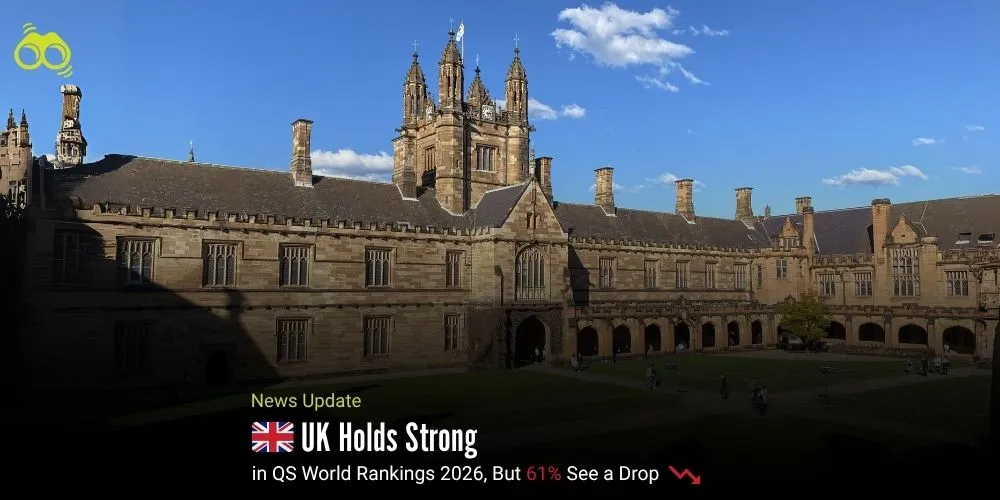Imperial Holds Second Globally as UK Institutions Navigate Challenges in QS Rankings
QS Rankings 2026: UK Universities Face Competitive Pressures Amid Global Shifts
In the latest QS World University Rankings for 2026, the United Kingdom has maintained a prominent global academic presence, with seventeen institutions placed among the top 100 worldwide. Most notably, the University of Sheffield and the University of Nottingham have re-entered this distinguished group, reflecting renewed academic performance and growing international influence.
Nevertheless, the overall trajectory for UK institutions suggests mounting challenges. While Imperial College London retained its position as the world’s second-best university, and Oxford, Cambridge, and UCL remained within the top 10, Oxford and Cambridge each slipped by one place due to Stanford’s ascent to third. Simultaneously, 61% of UK universities experienced a decline in rankings, a shift largely attributed to intensifying global competition, particularly from rapidly advancing education systems in Ireland, the Netherlands, and Hong Kong.
Of the 90 UK institutions listed, making the UK the second most represented country after the United States, 24 saw improvements, 11 remained stable, and 54 declined. These figures underscore the broader trend of rising international competition. The University of Edinburgh, despite dropping from 27th to 34th, continued to receive positive sentiment from its international students. PhD scholar Sean Xia voiced pride in the university’s ongoing top-50 status and expressed hope for future improvements, citing continued research excellence as the key driver.
Beyond Edinburgh, there were notable gains. The University of Liverpool rose from 165th to joint 147th, marking the most significant improvement within the Russell Group. PhD candidate Derek Zhou interpreted this climb as progress toward the university’s strategic goal of breaking into the global top 100 by 2031. Other institutions such as Oxford Brookes (+42 spots), Strathclyde, Aston, Surrey, Birkbeck, and Bradford also made advances exceeding 20 places, while Sheffield and Nottingham rejoined the top 100 at ranks 92 and 97, respectively.
However, despite individual successes, concern has been expressed over the UK's overall outlook. QS CEO Jessica Turner highlighted that current government policies, including proposed funding cuts, an international student levy, and a reduced Graduate Visa period, pose risks to the stability and quality of higher education. Although the recent spending review provided R&D support, she emphasised the need for stronger and more sustained backing to compete globally.
Meanwhile, the global rankings reflect shifting power dynamics. The United States continues to lead with 192 ranked institutions, 42% of which improved. Australia lost one university from the top 20, whereas South Korea gained one. China’s ascent also stood out, with Tsinghua ranking 17th and Fudan entering the top 30. Notably, Saudi Arabia and Italy joined the top 100 for the first time, with King Fahd University and Politecnico di Milano ranked 67th and 98th, respectively. In addition, Turner pointed to strong performances from countries such as Ireland, Malaysia, the UAE, Germany, and New Zealand, where over half of their ranked institutions demonstrated improvement. Germany showed clear signs of recovery, and Hong Kong emerged as the second most improved system behind Ireland. While the UK retains a significant foothold in global university rankings, maintaining its position will require cohesive policy reform and strategic investment to meet the accelerating pace of international academic advancement.
Editor's Note:
The QS World University Rankings 2026 show that the United Kingdom continues to play a strong role in global higher education. With 17 universities in the top 100 and a total of 90 institutions ranked, the UK is the second most represented country after the United States. This success reflects the UK's ongoing efforts in improving education, research, and policy. For example, the UK government recently announced over £190 million in extra funding to support education for students aged 16 to 19 in important fields. Top universities like Oxford are also helping low-income students by offering bursaries of up to £6,270. Other steps, such as a 3.1% increase in tuition fee caps and more support grants, show a thoughtful plan to keep education both high-quality and accessible. Strong research, a focus on sustainability, and international cooperation, especially at universities like UCL and Edinburgh, also help keep the UK competitive worldwide.
Skoobuzz acknowledges that even with challenges, the UK’s universities are moving forward with determination, aiming for excellence and making sure students from all backgrounds can succeed.














0 Comments (Please Login To Continue)